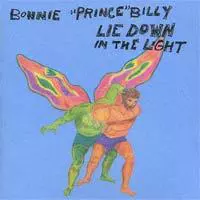To call Lie Down In the Light a folk album would be doing it a great disservice. However, steeped in traditional song forms, it's easy to make the comparison. After 15 years of recording, Will Oldham, now as well-established moniker Bonnie "Prince" Billy, has somehow recaptured the zeitgeist. As boomers grow nostalgic for their youth, we're all increasingly looking back to the politics and themes of the late `60s, mirroring the swing America took during the Vietnam conflict. The resurgence of folk music, protest songs and psychedelic music also opened the gate for lesser known music trends: Appalachian bluegrass and Middle Eastern influences. It was a pull towards two contrasting ideals -- a harkening back to a simpler time and an expansive journey into something foreign and exotic. Both options functioned as basic escapism in desperate times. Somewhere, between the two and 40 years later, Lie Down In the Light picks up where they left off.
Utilizing various auxiliary percussion to provide a backbone for most songs, Oldham's guitar picking never strays too far rootsy chord progressions. No matter how traditional Oldham's approach is, his delivery and song craft are always top notch. Key instrumentation -- like the fiddle on opener "Easy Does It" and the prominent jazzy clarinet solo on the country chorded "For Every Field There's a Mole" -- adds miles of depth when paired with Oldham's honest and blunt lyrics. New to the album, however, are the upbeat Middle Eastern rhythms of "(Keep Eye On) Other's Gain" and "Where's the Puzzle?" Oldham lets some tonal quality permeate the former, as well.
As always, the lyrics focus on love, loss, self and exploring the concept of God. The simple honesty of lines like "I know that missing you has just begun / there's years to come" and "For every field there's a mole / with the soil that he stole / and the sightlessness that lets him go free" are perfect examples of why his fans are typically devotional instead of just fanatic. They roll of the tongue with ease, but listening to them being sung creates a weight of emotion.
The modern world as Americans know it is a constant flow and broadcast of information focusing on worldly troubles. Politics and economies are causing externally influenced stress, but the works of Will Oldham cause the listener to be painfully aware of the self. And while the Appalachian bluegrass and Middle Eastern exploration of the late `60s provided escapism for the worried mind, Lie Down In the Light instead forces the listener to be present in his or her own world, and gives them the introspection necessary to survive.
